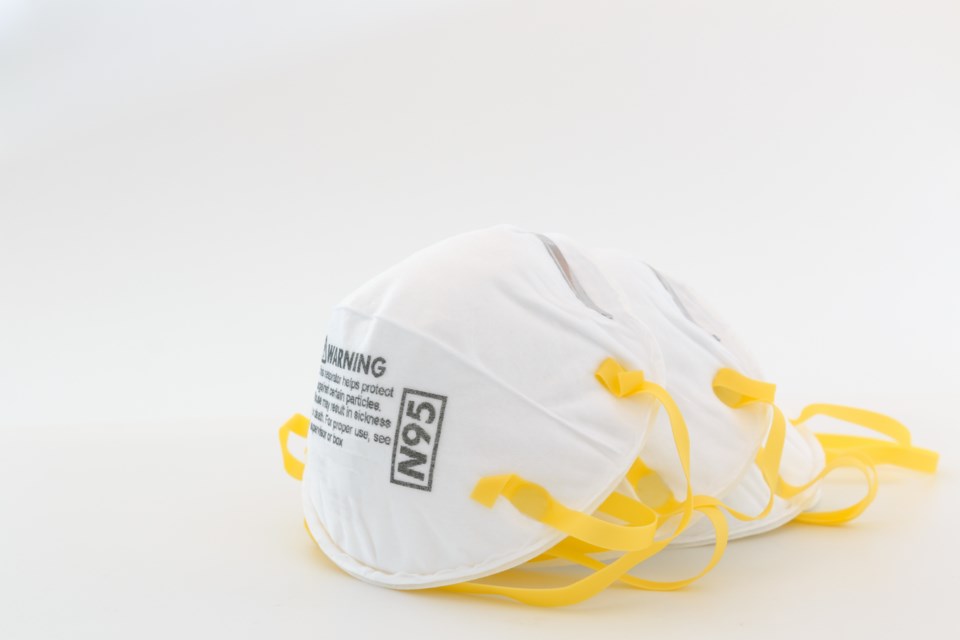As the province scrambles to find enough N95 masks to protect front-line workers against COVID-19, one Sudbury engineer believes the mining industry could have a greater role to play in helping to meet that need.
Since mid-March, Nicolas Smit has been on a one-man mission to raise awareness about the available alternatives to the N95 masks.
Although N95s have become standard equipment for health-care workers, Smit argues there are plenty of other equally, if not more, effective options that should also be considered for use.
“My main goal is just to raise awareness so that the hospitals around the world can know to ask for these,” said Smit, a trained mine engineer technologist, who currently works as a warehouse associate for Toromont Cat.
All protective face masks come with a rating comprised of a letter and a number. The ‘N’ in N95 indicates the mask is ‘not oil resistant,’ while the 95 refers to the percentage of particulates, measuring 0.3 microns or larger, that the mask can filter out.
The N95 offers great protection, which is why it’s widely used in the health-care field.
They’re also easily found at hardware stores and popular amongst do-it-yourselfers tackling home reno projects.
But Smit believes the P100 respirator mask, in particular, is a great secondary option, because it’s oil-proof and can block 99.97 per cent of airborne particulates.
Here’s where the mining industry comes in.
At many mine operations, Smit said, P100 masks are not only plentiful, but mandatory.
From his personal experience working in Sudbury, for example, he said he was instructed that any worker on a mine site must have a minimum P100 mask on their person in the event of an emergency.
“If there’s a release of gas, they sound the alarm and when the alarm sounds, that’s the first thing you do is put it on,” said Smit, a former executive officer with the Sudbury chapter of the Canadian Institute of Mining, Metallurgical and Petroleum (CIM).
With operations at so many mines across Northern Ontario having curbed or temporarily ceased operations amid the pandemic, Smit believes this is an ideal opportunity for the industry to step up and help.
Donating masks to area hospitals or health clinics could help protect front-line workers who may not even be aware that these masks are available, he said.
“The PPE is just sitting there not being used.”
He even suggests that a government tax break on donations could be one way to create more of an incentive for companies to donate.
Want to read more stories about business in the North? Subscribe to our newsletter.
Smit brought his suggestion to Carol Hughes, MP for Algoma-Manitoulin-Kapuskasing, and France Gélinas, MPP for Nickel Belt, who have moved the idea up the chain of their respective governments.
Gélinas sits in on a thrice-weekly conference call with the province’s COVID-19 Command Table, including Ontario's chief medical officer of health, Dr. David Williams, where options for PPE have been discussed at length.
Though the P100s were brought up as an option, they’ve yet to be approved for use by Health Canada, Gélinas said.
“(The province is) very happy with what's coming in,” she said. “But for the mask in a hospital setting, they are pretty much sticking with the surgical mask to protect others and the N95 to protect others and the wearer, and so far that's all that I have seen.”
Both parliamentarians noted that, while the P100 masks offer protection, they do pose some concerns for a health-care setting.
While the mask helps filter the air being breathed in, there’s no certainty it filters the air breathed out. So, protection is only guaranteed for the wearer of the mask.
Also, the mask can impede communication between workers, or between a worker and their patient.
Hughes said she’s aware of some Northern Ontario hospitals receiving donated P100s, but is unaware if they’ve been used.
Still, she applauded Smit’s initiative, suggesting that, in a crisis situation, any and all suggestions are welcome.
She advised people go through the federal government's procurement process set up to address COVID-19 needs as the most expeditious way to get a suggestion through to Health Canada.
"Then it would have to go through that process of being evaluated, assessed, or tested, and then decide from there,” Hughes said.
Smit acknowledges the P100s aren’t a perfect solution.
But at some hospitals, where PPE is scarce and health-care workers are at increased risk of being infected, he believes a P100 mask could be better than nothing.
Smit is challenging the mining industry to donate where they can, and encourages other industries with masks on hand to take heed as well.
“They’re used in construction, manufacturing, agriculture, pharmaceuticals,” Smit said. “So we could easily help all the hospitals get all the respiratory protection they need.”




